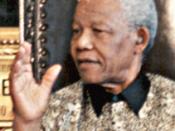The principle of the 'tyranny of the majority' has been explored since the earliest studies on modern democracy. Indeed, it was Alexis de Tocqueville in his Democracy in America who coined the term. It is the capacity of the majority of the people to have the right to everything is it were (de Tocqueville, 1992). He argues that, though it may be the will of most, this does not justify imposing tyrannical excesses on a minority or even a single man. He remarked that though The United States of America was a liberal power, due to the lack of a "guarantee against tyranny" the state had the potential to impose its will, made legitimate by a mandate from the American people; thus there was a risk of the 'tyranny of the majority'. South Africa is a new democracy, recently 'transformed' from the several decades of extreme racial oppression and segregation of Apartheid.
And though the Republic has made a smooth transition towards democracy the bitterness from Apartheid rule can not be ignored in the light of a new found 'majority rule' in South Africa. Can it thus be said that 'Majority rule has brought with it the 'tyranny of the majority'?
To understand the political situation in South Africa today, one must first understand its history which is very much reflected in the current form of government and political institutions in place. White Supremacism took its roots in South Africa, as it did elsewhere, but it was taken to greater extremes than anywhere else, and was institutionalised at all levels of South African life (Worden, 1994). Not only was the black population considered inferior and subservient but racial discrimination was pushed to the attempted segregation of every aspect of life (Worden, 1994). Thus it was that the period 'Apartheid', meaning,



Essay
Very clear and precise wording. To the point but did not drag it out getting to the facty of the esay. he essay flows very smoothly nice easy reading.
3 out of 4 people found this comment useful.